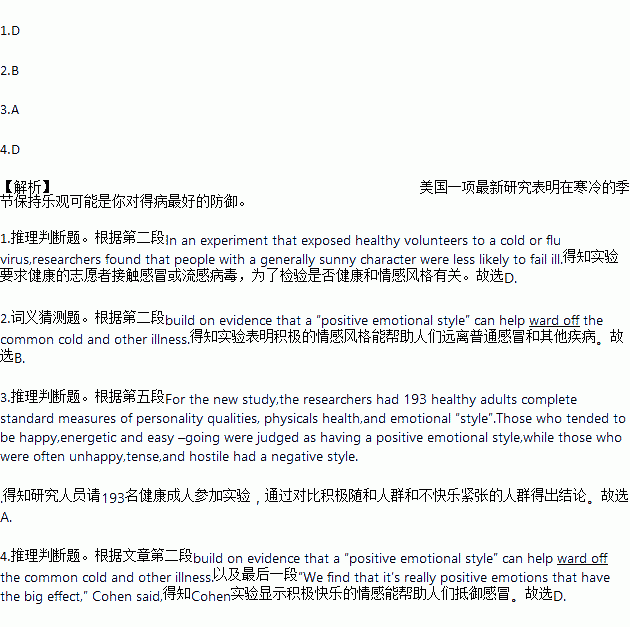题目内容
Staying positive through the cold season could be your best defense against getting ill,a new American study suggests.
In an experiment that exposed healthy volunteers to a cold or flu virus,researchers found that people with a generally sunny character were less likely to fail ill.The findings,published in the journal Psychosomatic Medicine, build on evidence that a “positive emotional style” can help ward off the common cold and other illness.
Researchers believe the reasons may be both objective―as in happiness improving immune function―and subjective―as in happy people being less troubled by a sore throat or runny nose.“People with a positive emotional style may have different immune responses to the virus,” explained lead study author Dr Sheldon Cohen of Carnegie Mellon University in Pittsburgh.“And when they do get a cold,they may interpret their illness as being less severe.”
Cohen and his colleagues has found in a previous study that happier people seemed less likely to catch a cold, but some questions remained as to whether the emotional quality itself had the effect.
For the new study,the researchers had 193 healthy adults complete standard measures of personality qualities, physicals health,and emotional “style”.Those who tended to be happy,energetic and easy –going were judged as having a positive emotional style,while those who were often unhappy,tense,and hostile had a negative style.
Afterwards,the researchers gave them nose drops containing either a cold virus or a particular flu virus.Over the next six days,the volunteers reported on any aches,pains,sneezing they had,while the researchers collected objective data.Cohen and his colleagues found that happy people were less likely to develop a cold.
What’s more,when happy folks did develop a cold,their symptoms were less severe than expected based on objective measures.
On the contrary,people with negative characters were not at increased risk of developing a cold based on objective measures,though they did tend to get down about their symptoms.
“We find that it’s really positive emotions that have the big effect,” Cohen said,“not the negative ones.”
So can a bad-tempered person fight a cold by deciding to be happy?
1.The purpose of Cohen’s new study was to .
A. find effective ways to fight illnesses
B. test people’s different immune responses to cold virus
C. tell differences between happy people and unhappy people
D. examine whether health was related to emotional styles
2.The underlined phrase “ward-off” in Paragraph 2 means “ ”.
A. get close to B. keep way from C. get used to D. go on with
3.How did Cohen reach his conclusion?
A. By comparing the experimental results of different groups.
B. By asking the volunteers to complete a form.
C. By collecting data among people with a cold.
D. By observing the volunteers’ symptoms.
4.Cohen’s new study showed that .
A. an emotional style is difficult to change B. happy people are immune to cold virus
C. people attitudes towards illnesses are different D. happiness itself helps protect people from cold
 口算题卡北京妇女儿童出版社系列答案
口算题卡北京妇女儿童出版社系列答案假定你是李华,你对本班50个学生进行了健康问题的问卷调査。请给你的班主任兼英语老师Jack写一封电子邮件,告知调査的结果和自己的建议。内容主要包括:
1.依据表格内容,综述学生当前存在的健康问题;
2.就中学生如何保持身心健康提出自己的建议。
注意:1.词数100左右;
2.可适当增加细节,以使行文连贯。
问题类型 | 学习焦虑 | 睡眠不足 | 缺乏锻炼 | 视力不佳 |
人数 | 35 | 40 | 25 | 35 |
比例 | 70% | 80% | 50% | 70% |
Protection Publications
Consume Health: A Guide To Intelligent Decisions Eight softcover edition of leading college text covering all aspects of basic health strategy for consumers. This new edition of the most comprehensive text available in the field continues to provide a vast amount of information to enable consumers to make wise choices regarding health products and services. By Stephen Barrett. 608 pages, $23.00 |
Chiropractic(手疗法): The Greatest False Warning Of The Century? L. A. Chotkowski describes discoveries made during his half-century of medical practice. It includes reports of cases; the author’s observations at New Chiropractic College, a chiropractic office, and a chiropractic lecture; and details of critical reports in the media. Second edition, softcover, 209 pages, $15. |
The Whole Tooth The fundamental guide to protecting your dental health and your pocketbook. It covers preventive care, finding a good dentist, dental restoring, cosmetic dentistry, dental quackery(治疗)and fraud(假牙),and dental insurance programs, including managed care. By Marvin J. Schissel, and John E. Dodes. Softcovr, 284 pages, $10. |
Quackery And You The 32-page softcover brochure with special viewpoints by William Jarvis, Ph. D. , suitable for waiting rooms. $1. |
To above prices, please add $3 for the first book and $1 for each additional book for postage & handing. Foreign countries add $5 per book. Send orders to Quackwatch, P. O. Box 1747, Allen Avenue, NY 18105. The checks must be in US dollars. We cannot process credit card orders. Please use our order form from amazon.com and you can get more information from it.
1.A Canadian wants to buy all the four books and he should pay__________.
A. $69 in all B. $49 in total
C. by credit card D. in Canadian dollars
2.From the text, we learn that______________.
A. The means of cover packing of the books are different
B. Quackery and You is designed for those waiting to see the doctor
C. Consumer Health includes much information on critical reports
D. L. A. Chotkowski provides you with all of your dental needs
3.What can you do to search for more information about the books?
A. Buy the brochure B. Write to the author
C. Telephone the sellers D. Visit amazon.com

